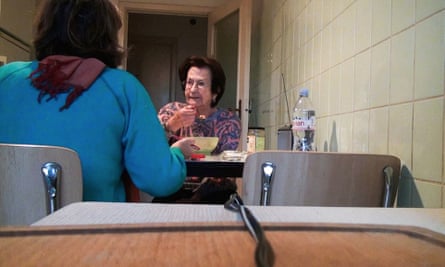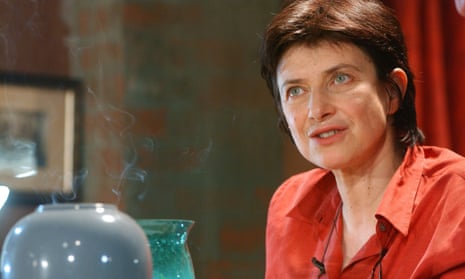The last time I saw Chantal Akerman’s 1975 masterpiece of hair-trigger minimalism, Jeanne Dielman, 23, Quai du Commerce, 1080 Bruxelles, I was transfixed by the lights that flicker outside the window of Dielman’s’s chintzy, prison-like abode. As her pained existence as a housewife and clandestine sex worker descends further into tatters – button by button – this beacon is her only constant, a severe reminder of life’s metronomic trudge.
The devastating final shot of the film sees Jeanne sat alone at a dining table. She breaks down, and the light just keeps on flashing in its SOS-type formation. The focal point of the shot is an outpouring of naked emotion, yet Akerman teases and jokes with the oscillations of her lamp. You can read this subtle detail as an ironically trite commentary on retaining hope and powering through misery. Or you can read it as a suggestion that time is unfeeling, and that life will continue without you if you refuse to keep up. This tragic woman, who we have come to know intimately over three-and-a-half intoxicating hours (but do we love her?), sits amid this quiet maelstrom of transcendence and existential despair. Then the film abruptly cuts to black.
I’m still reeling from the news of Akerman’s death at the age of 65. It comes as doubly shocking because the beautiful film that turned out to be her swansong, No Home Movie, is itself an intricate reflection on strategies used for ushering elderly family members towards the grave. It presented Akerman as inquisitive and contented, travelling the globe, buying new hats, making big salads, gabbing, loafing, teaching.

As with the external light in Jeanne Dielman, No Home Movie sees Akerman constantly return to a shot of a dilapidated sun lounger that hunkers, unloved, in the garden belonging to her ageing and ailing mother, Natalia. Every time she visits the house, she wanders on to the balcony for a smoke and tilts her camera down to check that the garden is still there. The implication is that Akerman loved that sun lounger, that she maybe saw it as a symbol of her relationship with her mother, and that she sat in it while Natalia tended to the plants.
No Home Movie is also a self-lacerating portrait, and Akerman appeases herself by claiming that transatlantic Skype conversations are as good as the real thing. The film ends up being less a celebration of her mother’s life and times and more a melancholic admission that death not only removes people from our lives, but also removes places, objects, stories and feelings.
These apparently inconsequential details lift Akerman’s cinema towards the sublime: the eerie, HAL 9000-like lift buttons from Hotel Monterey (1972), which transformed a precise chronicle of the goings-on at a ramshackle New York hotel into something approaching cerebral science fiction; her lyrical humanist masterwork Tout un Nuit (1982), whose “exquisite corpse” structure beat Richard Linklater’s Slacker to the punch by some nine years; the hepcat Greek chorus who fuse together scenes of lip-smacking heartbreak in her scintillating consumerist musical, Golden Eighties (1986); the haunting slow tracking shot of “empowered” citizens queuing, sour-faced, as the snow coats them in her documentary, From the East (1993).
Maybe it is disingenuous to celebrate these solitary moments and not the tremendous body of work at large? But Akerman understood that an unflagging dedication to minutiae – finding a focus, then focusing some more – fuelled her profound postulations about life, love, people, relationships, the whole bit. She was, absolutely no question, one of the greatest film-makers who ever lived. And the light that shines outside of Jeanne’s window is a symbol of Akerman’s work, a reminder that someone looked at the world – and also saw it.





Comments (…)
Sign in or create your Guardian account to join the discussion